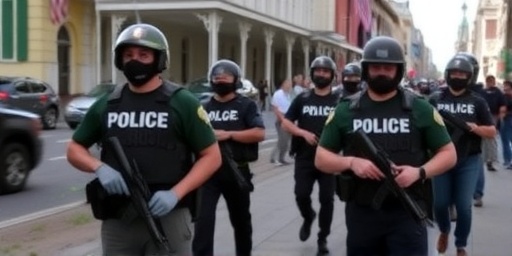In a bold move signaling intensified Immigration crackdowns, the Trump administration has dispatched over 200 federal agents to New Orleans, transforming the vibrant Louisiana city into a key battleground in the nation’s ongoing enforcement efforts. This deployment, announced late last week, is part of a broader initiative to ramp up operations against undocumented immigrants across major urban centers, drawing immediate attention from local communities and national watchdogs alike.
New Orleans Emerges as Immigration Enforcement Hotspot
New Orleans, long celebrated for its cultural melting pot and resilient spirit, is now at the epicenter of President Trump’s aggressive Immigration strategy. The deployment of more than 200 federal agents—primarily from Immigration and Customs Enforcement (ICE) and Border Patrol—marks one of the largest single-city mobilizations in recent years. Officials from the Department of Homeland Security (DHS) confirmed that the operation targets areas with high concentrations of undocumented workers, particularly in the hospitality and construction sectors that have rebounded post-Hurricane Katrina.
According to DHS spokesperson Lisa Johnson, “This surge in New Orleans is a direct response to intelligence indicating significant immigration violations in the region. We’re committed to enforcing the law fairly and decisively.” The agents arrived in waves over the weekend, setting up temporary command centers in the French Quarter and surrounding neighborhoods. Early reports suggest the focus is on workplaces like restaurants, hotels, and shipyards along the Mississippi River, where undocumented labor has been a persistent issue.
Statistics underscore the stakes: The Pew Research Center estimates that Louisiana has over 100,000 undocumented immigrants, with New Orleans hosting a disproportionate share due to its economic recovery needs. In fiscal year 2023 alone, ICE conducted 1,200 arrests in the state, a 25% increase from the previous year. This latest push could double those numbers, experts predict, as federal agents collaborate with local law enforcement under expanded 287(g) agreements that allow sheriff’s deputies to act as immigration officers.
Local business owners express mixed sentiments. Marie Duval, a Creole restaurant proprietor in the Marigny district, told reporters, “These folks have been part of our community for years, working hard to rebuild after the storms. Raids like this could cripple our industry.” Yet, supporters of the enforcement hail it as necessary. Louisiana Governor Jeff Landry, a Trump ally, stated in a press release, “Protecting American jobs and borders starts right here in the South. We’re standing with the President on this.”
Federal Agents Gear Up for High-Impact Raids and Surveillance
The mechanics of this immigration enforcement operation in New Orleans reveal a sophisticated blend of technology and manpower. Federal agents are equipped with advanced tools, including facial recognition software, drone surveillance, and mobile biometric scanners, to identify and apprehend targets swiftly. Training sessions held prior to deployment emphasized de-escalation tactics, but the scale—over 200 agents—suggests a zero-tolerance approach reminiscent of operations in sanctuary cities like Los Angeles and Chicago.
ICE Director Thomas Homan, a holdover from Trump’s first term, outlined the strategy in a recent briefing: “New Orleans isn’t just another city; it’s a hub for smuggling routes from the Gulf. Our federal agents will conduct workplace audits, traffic stops, and community sweeps to root out violations.” Sources within the agency indicate that the deployment includes specialized units for family separations if minors are involved, though officials stress that the primary goal is adult workforce enforcement.
Historical context adds depth to this escalation. During Trump’s first administration, similar surges in cities like Phoenix and Atlanta led to over 10,000 arrests nationwide in a single quarter. In New Orleans, past operations in 2019 resulted in 150 detentions, disrupting local economies temporarily but boosting deportation numbers by 40%. This time, with Trump’s renewed focus on immigration as a 2024 campaign pillar, the stakes are higher. Budget allocations for ICE have increased by $500 million under the current administration, funding not just agents but also detention facilities in nearby Avoyelles Parish, which can hold up to 1,000 individuals.
Community advocates worry about the human cost. The Southern Poverty Law Center reported that such enforcements often lead to racial profiling, with Latino and Haitian communities in New Orleans—numbering around 15,000—bearing the brunt. “These federal agents aren’t just enforcing laws; they’re tearing families apart,” said immigration attorney Elena Ramirez, who has represented dozens in similar cases.
Community Backlash and Support Divide New Orleans
As federal agents fan out across New Orleans’ iconic streets, the city is grappling with a polarized response to this immigration crackdown. Neighborhoods like Central City and Algiers Point, home to diverse immigrant populations, have seen impromptu protests and heightened vigilance. On Sunday, over 500 residents rallied at Louis Armstrong Park, waving signs reading “New Orleans Welcomes All” and chanting against what they call Trump’s “fear-mongering tactics.”
Mayor LaToya Cantrell, a vocal critic of federal overreach, issued a statement urging calm: “While we respect the rule of law, this deployment risks undermining the trust we’ve built in our multicultural city. New Orleans thrives on unity, not division.” Her office has directed city police to limit cooperation with ICE unless criminal warrants are presented, echoing sanctuary policies in other blue-leaning areas. However, enforcement supporters, including the Louisiana Sheriff’s Association, argue that non-cooperation endangers public safety.
Personal stories highlight the tension. Juan Morales, a 45-year-old construction worker from Mexico who has lived in New Orleans since 2005, shared his fears anonymously: “I came here after Katrina to help rebuild. Now, with federal agents everywhere, my kids are scared to go to school. This enforcement isn’t justice; it’s punishment.” Conversely, local union leader Mike Thibodeaux praised the move: “Undocumented workers undercut wages for citizens. Trump’s enforcement will level the playing field for hardworking Americans in the trades.”
Polls reflect the divide. A recent University of New Orleans survey found 52% of residents support stricter immigration measures, up from 45% in 2022, attributed to economic pressures like inflation and housing shortages. National groups like the Federation for American Immigration Reform (FAIR) have mobilized, sending volunteers to assist agents with tips on potential violations. Meanwhile, organizations such as the ACLU are filing lawsuits, claiming the deployment violates due process rights under the Fourth Amendment.
Trump’s Nationwide Immigration Vision Takes Shape in the South
This New Orleans deployment is no isolated event but a cornerstone of President Trump’s expansive immigration enforcement blueprint. Since returning to office, Trump has prioritized border security and interior removals, signing executive orders to expand expedited deportations and revive the “Remain in Mexico” policy. The administration’s goal: 1 million deportations annually, a figure that would dwarf Obama-era numbers.
In the South, New Orleans serves as a strategic launchpad. Proximity to Gulf smuggling routes and a port handling 500 million tons of cargo yearly make it ideal for intercepting human trafficking. Trump’s team has allocated $2 billion for southern operations, including agent training in tactical response and partnerships with states like Texas and Mississippi. “Immigration enforcement isn’t optional; it’s essential to national sovereignty,” Trump declared during a rally in Baton Rouge last month, where he announced the New Orleans surge to cheers from 20,000 attendees.
Broader data paints a picture of acceleration. ICE’s enforcement and removal operations (ERO) budget has surged 30% since 2021, enabling deployments like this one. Comparable actions in Atlanta and Houston have yielded 5,000 arrests in the past six months, with 70% involving criminal convictions. Critics, including the Migration Policy Institute, argue that such focus diverts resources from violent crime, noting that only 15% of ICE arrests target non-criminal immigrants.
Economically, the impact ripples outward. New Orleans’ tourism industry, generating $10 billion yearly, relies on immigrant labor for 20% of jobs. Disruptions could lead to labor shortages, echoing 2018 shutdowns that cost the city $50 million. Yet, proponents point to long-term benefits, like reduced strain on public services—undocumented immigrants in Louisiana cost taxpayers $1.2 billion annually in education and healthcare, per a 2023 state report.
Challenges Ahead: Legal Battles and Long-Term Enforcement Shifts
Looking forward, the New Orleans deployment foreshadows a turbulent path for Trump’s immigration agenda. Legal challenges are mounting, with immigrant rights groups preparing class-action suits alleging unconstitutional searches. The Fifth Circuit Court of Appeals, which oversees Louisiana, has a conservative bent but has ruled against expansive ICE powers in past cases, potentially delaying operations.
Logistically, sustaining 200+ federal agents requires ongoing funding battles in Congress, where Democrats push for humanitarian reforms like DACA expansions. If successful, this could blunt enforcement edges. Public opinion, volatile as ever, may shift with high-profile incidents—such as family separations or workplace chaos—that dominate social media and cable news.
On the horizon, Trump officials hint at expansions to other port cities like Miami and Savannah, aiming for a “zero-tolerance zone” along the Gulf Coast. Success in New Orleans could embolden further surges, potentially reshaping immigration patterns and community dynamics for years. As agents patrol the bayous and boulevards, one thing is clear: the Crescent City’s role in America’s immigration debate is just beginning to unfold.








